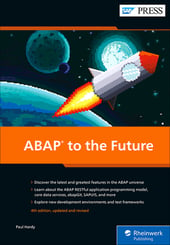In the novel 1984 by George Orwell the way Big Brother would break prisoners was by taking them into Room 101. In that room, what awaited each prisoner was the thing they feared the most—which naturally varies from person to person.
So…if the prisoner were an ABAP programmer, what would they find in the room? What are they most scared of?
Someone who found out the hard way was Ebenezer Scrooge—it’s a little known fact he was an ABAP programmer and was taken to Room 101 on Christmas Eve. After a while he went to sleep, and then he was visited by three scary ghosts.
The Scary Ghost of ABAP Past
You may have heard the term “Luddite” applied to anyone who does not welcome new technology with open arms. This is a historical reference to a group of people who were worried the new machines created during the industrial revolution would leave them unemployed. They attempted to get around that problem by smashing those new machines to pieces with sledgehammers. In 1812, the UK government increased the penalty for this behavior from transportation to Australia to death.
In slightly more recent times—starting about 1950—many people started predicting that soon companies would be able to produce tailor-made software by just saying what they wanted and “not one line of code” would need to be written. Hence you could sack all your programmers. This naturally made many computer programmers (who programmed using punch cards when this first started) concerned for their jobs in the same way the Luddites had been concerned about their jobs. However, over the next five decades, the same “not one line” claim was made constantly and nothing ever actually happened, so the programmers became somewhat less concerned.
In the last few years—because there is nothing new under the sun—history is repeating itself.
Firstly there are fears that robots will take all human jobs, from artists to soldiers, and that soon the “singularity” will occur, and a self-aware artificial intelligence will overthrow the Earth.
It is very difficult to smash up all the robots and AI systems in the world with hammers but many people would like to do that exact thing if they could.
Secondly, in regard to the “not one line of code” claim—that is still going, naturally. These days it is called a “low code/no code” solution, and there are plenty on the market, including from SAP itself. Another name is Robotic Process Automation even if the “robots” are software rather than Terminator types. In any event, the end result of this is that programmers are still to this day getting assorted messages saying their jobs are at risk.
At this point Scrooge was not worried at all. He had been shown that people had been warned about machine-based threats to their job for centuries and nothing ever came of it.
The Scary Ghost of ABAP Present
One of the perceived strengths of ABAP is that it has (up until now) always been 100% downwards compatible, which is not the case with many programming languages. In other words, the ABAP code you wrote in 1997 on a 3.0 system will still run on an ECC 6.0 EHP8 system in 2021.
Whilst that makes upgrades easier, the downside is that there was no actual need to learn any new technology that came out after you started ABAP programming. This led to many people doing things the exact same way in 2020 as they did in 2000. Humans are naturally lazy and if you kept doing the same thing and it kept working and you kept getting paid, why waste time leaning anything new?
This type of behavior was highlighted in a famous blog by Graham Robinson called “A Call to Arms” in 2012. The reason I keep quoting that blog is because it is as true today as it was in 2012.
Two ghosts down and Scrooge still was not worried—after all, he had been shown that you could just keep on doing the same thing and you would be OK.
The Scary Ghost of ABAP Yet to Come
This was all well and good: right up until the point SAP released SAP S/4HANA, which is not 100% downward compatible, and “ABAP in the Cloud” (the SAP Business Technology Platform, ABAP Environment) which is not downward compatible at all. Moreover, since about two years ago, a new version of ABAP comes out every three months and the changes are not trivial.
So someone who started at age 20 and is currently age 40 and has not bothered learning anything new in the interim is suddenly faced with a sea of acronyms they have no idea about– CDS/UI5/RAP and so on—and most importantly they have to face the fear that they have become obsolete.
Being made redundant is bad but not the end of the world; hopefully you can get another job. However, if you are obsolete there is no going back. When this happens to you it is known as a “Kodak Moment” after the company that refused to acknowledge the world had changed and paid the price.
At this point the penny dropped for Scrooge and he was finally terrified. What if he lost his job and had to compete with candidates who knew what in the world an AMDP was, or what BOPF meant, or what BRF+ was used for? What if he did not lose his job but his company moved to SAP S/4HANA and he was forced to try and write a new program using the RAP? He didn’t even know what that stood for!
He screamed and screamed and screamed—and woke up!
Wake Up – It’s a Beautiful Christmas Morning!
Things always look better in the morning, especially when the snow is falling, and children are singing, and bells are ringing, and chestnuts are roasting on an open fire, etc.
You cannot deal with any problem until you realize you have a problem, and thus Scrooge was grateful to the ghosts for bringing it to his attention before it was too late. So now he had staggered out of Room 101. How to solve the problem? It’s not as easy as buying a turkey and giving it to someone.
As someone once said, “The problem need not be severe, the super-magic answer’s here!”
The first and most important thing—and this gets lots of people out of their comfort zone—is to do some research and learning in your spare time. During work time you are always too busy.
I know one consultant who only works four days a week and spends the other day learning new things. As a result, he is so far ahead of his competitors and can charge higher rates, and so that one day a week more than pays for itself.
You do not have to go bananas like that—if you spend even one hour a week learning new things, you are one hour up on the vast majority of people who just spend their spare time playing Fortnite and watching Netflix. And think how much more you could benefit if you spent over an hour a week learning!
Secondly—there is just so much free information available on the internet. The SAP Community is just crawling with information, and every day new and useful blogs come out. You can filter and search for just your topics of interest such as ABAP development.
In the same way there are totally free openSAP courses on a wide variety of topics including various aspects of ABAP development.
Lastly, if you want to go the extra mile, there are also resources available you can pay for.
One example would be the SAP online learning site Michael Management.
And naturally SAP PRESS has a wide variety of books available for purchase, covering everything in the SAP universe! One such book is the fourth edition of ABAP to the Future, in which I share all the latest and greatest in the world of ABAP development.
This post was originally published 12/2021.




Comments